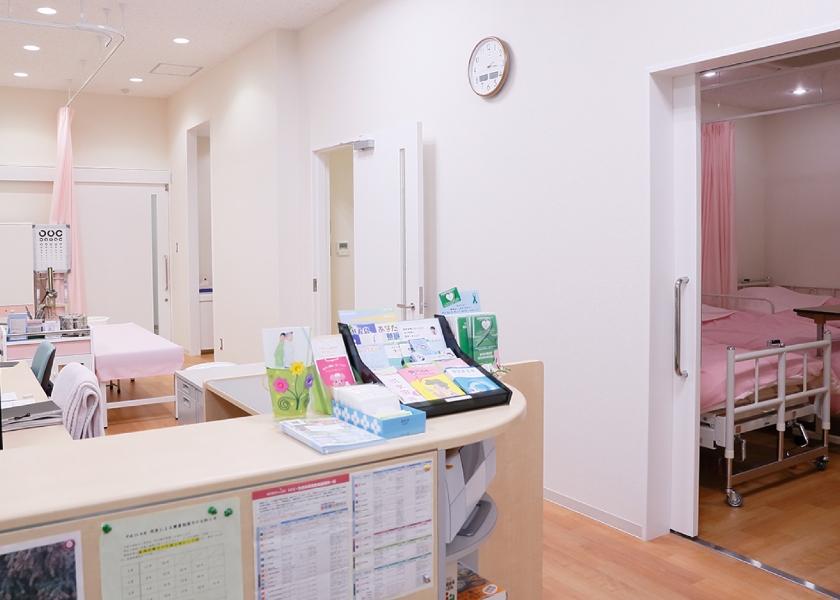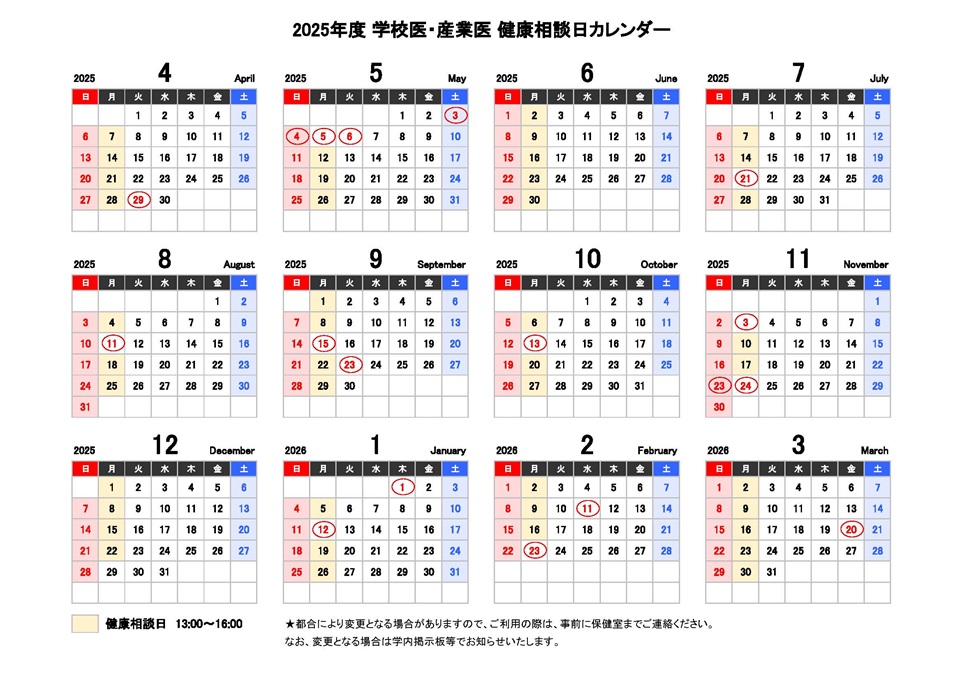- Asia University
- Student life
- Health Services Office
- Health Services Office
Health Services Office
PAGE SECTIONS
1.Usage guidance for Health Services Office
Health Services Office is located on the first floor of Building No. 5. It was established with the aim of supporting students in solving health problems and creating their own health so that they can live a better student life. We accept consultations on health-related matters, including physical concerns, health hygiene knowledge, and nutrition. Privacy is strictly observed, so please feel free to use the room.

First Aid
We will provide treatment in case of injury or sudden illness on campus. If you feel unwell, you can take a rest in the rest room. If Health Services Office cannot provide treatment, we will refer you to a medical institution.Oral medicines cannot be handled.
If you have any medications that you take on a regular basis, please keep them on hand at all times. If you have any chronic illnesses, please be sure to carry medications with you in case of an emergency.health consultation
A school doctor visits the school once a week to provide health consultations. Please feel free to make use of this service as it provides professional advice.<School doctor/industrial doctor health consultation days> Every Monday 13:00-16:00
In addition, nurses are available to answer any questions you may have, so please contact Health Services Office if you would like to receive a health consultation.

Body measurements
Height, weight, blood pressure, body fat, etc. can be measured. Please use it for daily health checks.2. About vaccination
We provide vaccination consultations and hospital information.The concept of vaccination has two meanings. One is to prevent the vaccinated person from contracting the disease, and to prevent the disease from becoming serious even if it does occur. The second is to prevent the spread of the disease to the population by having many people vaccinated.
Prevention of infectious diseases
Major infectious diseases that tend to spread among students who live in groups include measles, rubella, mumps, and chickenpox. These diseases have epidemic periods, and those who have not been vaccinated or have never been infected may become infected due to lack of immunity. At our university, in accordance with the guidance of the Ministry of Education, Culture, Sports, Science and Technology, we recommend vaccinations for those who have no memory of having the above diseases.For those considering studying abroad
Depending on the type of vaccination, it may take some time for antibodies to develop after vaccination. In addition, when performing multiple vaccinations, as a general rule, you must put a certain interval. If you need vaccinations for study abroad or Practicum, we recommend that you plan your schedule early and get vaccinated systematically.In addition to infectious diseases, the following website provides information to be aware of when traveling abroad.
Please be especially careful and prepare adequately when traveling.
- Ministry of Health, Labor and Welfare Quarantine Station FORTHFor staying healthy overseas
- About the Tokyo Metropolitan Government Bureau of Public Health's "Infectious Disease Prevention Guide for Overseas Travelers and Returnees"
- National research Infectious Diseases Center for Infectious Disease Epidemiology
3.In case of infection at school
If a child is diagnosed with a ``school infectious disease'' as stipulated in the School Health and Safety Act, attendance will be suspended to prevent the spread of infection. Until your doctor determines that you are able to return to school, please do not attend university and recuperate at home until you have recovered.For more information, please refer to the link below <If you contract a school infectious disease (new coronavirus, influenza, measles, etc.)>.
4. Information on medical institutions
Information on medical institutions near the university.Information on medical institutions in Tokyo at night and on holidays is provided by the medical institution guide "Himawari".
- Tokyo Medical Institution Information Service [Himawari]
- Tokyo Metropolitan Medical Institution Information Service [Himawari] Site for mobile phones
*When visiting a doctor, you can use the "Medical Benefit System".
For more information, please refer to the link below <Medical Benefit System (Asia Gakuen Student Health Insurance Mutual Aid Association)>.
5. Health management
It is said that the basics of health are largely cultivated during student days. It's important to think about a healthy lifestyle during this important time.Prepare your first aid kit
If you live alone, it is a good idea to prepare a first aid kit in advance so that you can deal with sudden injuries or illnesses yourself.In the first aid kit, in addition to oral medicines such as general cold medicine (cold medicine), gastrointestinal medicine, intestinal medicine, antipyretic analgesics, etc., there is also a thermometer, tweezers, nail clippers, anti-itch medicine, bandages, poultices, gauze, disinfectants, etc. Let's put it in. Please add whatever else you need to suit your physical condition and lifestyle.
Carry your health insurance card with you
If you don't have insurance, you will be charged a lot of money when visiting a hospital.There are many cases where people get into trouble when they suddenly become ill because they do not have their health insurance card. Please make it a habit to always carry your health insurance card with you, especially when traveling, at training camps, or on expeditions.
6. Alcohol and smoking are prohibited for those under 20 years of age
It is said that it usually takes 30 minutes to 1 hour for a person to feel intoxicated after drinking alcohol. If you drink more than you can tolerate before you become intoxicated, such as binge drinking, you may suddenly fall into a coma and even die when the alcohol reaches your brain. (acute alcohol poisoning)Consuming large amounts of alcohol in a short period of time is dangerous. Never do this!
Some people start smoking casually. Once smoking becomes a habit, it becomes difficult to stop smoking due to nicotine dependence and psychological dependence. Quitting smoking is difficult, but anyone can avoid smoking in the first place. Don't give up on cigarettes easily!
Let's consider the risks of smoking and the importance of quitting smoking.
Smoking e-Health Net Ministry of Health, Labor and Welfare
7. About AED installation location
Fire and disaster prevention measures Emergency equipment AED (automated external defibrillator)Health Services Office
<Updated March 26, 2025>